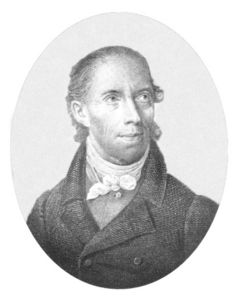Escape
(Poet's title: Flucht)
Set by Schubert:
D 825B
for TTBB quartet[early 1825]
In der Freie will ich leben.
In dem Sarge dumpft der Tod.
Sieh nur dort das Abendrot
Um die heitern Hügel weben,
In der Freie blüht das Leben,
In der Enge hockt die Not.
Eilt drum, eilt hinaus zu streben,
Eh das Herz zu stocken droht,
Licht und Luft und Raum ist not.
In der Freie will ich leben.
Traute Vögel, lasst uns schweben,
Folgsam der Natur Gebot.
I want to live in freedom,
Death decays in the coffin.
Just look there at the sunset
Weaving around the cheerful hills.
Life blossoms in freedom,
Danger lurks in confinement.
Hurry, so hurry to struggle out,
Before your heart risks coming to a stop!
There is a need for light and air and space.
I want to live in freedom.
Dearest birds, let us soar away,
Faithful to nature’s commandment.
All translations into English that appear on this website, unless otherwise stated, are by Malcolm Wren. You are free to use them on condition that you acknowledge Malcolm Wren as the translator and schubertsong.uk as the source. Unless otherwise stated, the comments and essays that appear after the texts and translations are by Malcolm Wren and are © Copyright.
☙
Themes and images in this text:
Air Birds Coffins Evening and the setting sun Fleeing Hills and mountains Light Space Weaving
Karl Lappe was very happily married and rarely travelled far from his home region around Stralsund and Greifswald on the Baltic coast of Pomerania. Nevertheless, he was able to give voice to a yearning to escape that must have been felt by many other seemingly settled and content individuals in his world.
The setting sun reminds us of our own mortality and the freshly illuminated hills on the horizon seem to invite us to escape the doom before us. We are aware of the coffin that will all too soon confine us completely and the restrictions and constraints that are already hemming us in. We long for light, air and space and we envy the birds who can fly away into such freedom. Yet, all of this is expressed within the constraints of a closed, formulaic verse form. The rhyme scheme is extremely restrictive (abbaab abbaab) and based on the tension between the ‘a’ rhyme of ‘leben’ (to live) and the ‘b’ rhyme of ‘Tod’ (death). This paeon to freedom all leads inexorably to the word ‘Gebot’ (commandment): there is no escape from this drive to freedom!
☙
Original Spelling Flucht In der Freie will ich leben. In dem Sarge dumpft der Tod. Sieh nur dort das Abendroth Um die heitern Hügel weben. In der Freie blüht das Leben, In der Enge hockt die Noth. Eilt, drum eilt hinaus zu streben, Eh das Herz zu stocken droht! Licht und Luft und Raum ist noth. In der Freie will ich leben. Traute Vögel, laßt uns schweben, Folgsam der Natur Gebot.
The first version of this text, published in 1815, was slightly different:
In der Freye will ich leben;
In dem Sarge dumpft der Tod.
Sieh nur dort das Abendroth
Um die heitern Hügel weben.
In der Freye blüht das Leben.
Fort aus dieser Enge Noth!
Eine Freystatt zu erstreben,
Wo kein wilder Schrecken droht!
Licht und Luft und Raum ist noth.
In der Freye will ich leben.
Traute Vögel, lasst uns schweben,
Folgsam der Natur Gebot.
I want to live in freedom,
Death decays in the coffin.
Just look there at the sunset
Weaving around the cheerful hills.
Life blossoms in freedom,
Away from the danger in this confinement!
Aspiring to a state of freedom
Where there is no risk of wild horrors!
There is a need for light and air and space.
I want to live in freedom.
Dearest birds, let us soar away,
Faithful to nature’s commandment.
Confirmed by Peter Rastl with Schubert’s source, Blätter von Karl Lappe. Erstes Heft. Lied und Leben. Stralsund, 1824. Gedruckt in der Königl. Regierungs-Buchdruckerei, page 76; and with Karl Lappe’s sämmtliche poetische Werke. Ausgabe letzter Hand. Erster Theil. Rostock, Verlag von J. M. Oeberg. 1836, page 60.
To see an early edition of the text, go to page 76 [102:76] here: https://digitale-bibliothek-mv.de/viewer/image/PPN750754354/102/


